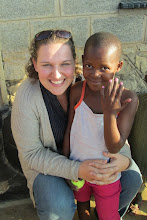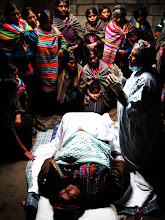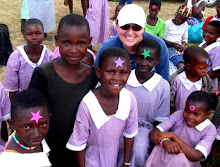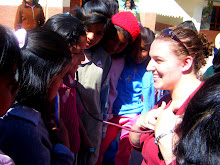I've been a teacher now for 10 days and I'm slowly settling into a schedule here at Linokong High School... It has been a week full of realizations.
The first is that I am now painfully aware that this job will be rife with frustrations, and if I'm ever going to survive I will have to actively focus on the sometimes hidden rewards. For example, I was ready to cry by the end of my Form B Math class last week. After 5 classroom hours of teaching Number Sequences, they seem no closer to grasping the concept of a general rule for a mathematical sequence than I am to understanding my colleagues' staff room chatter in Sesotho. It's frustrating already. I am all too aware that my accent and English confound them. I could have all the good intentions and mathematical brilliance in the world- It would do me no good here. All I receive in return is blank stares and puzzled expressions. It will get better, "easier" even. I know this for certain, but that doesn't mean that this job will ever be "easy." Not for me, and not for them. And I understand that better than anyone... I live in a community where I struggle daily to bridge and understand cultural difference (and sometimes even succeed!), but expressing it is a whole other ball game. I am at the mercy of my inability to speak Sesotho. So I can only imagine how my students feel. Trying to learn Algebra is one thing... Trying to learn it in a foreign language is quite another.
Yet the second part of this realization is that there ARE a million tiny, seemingly insignificant, and sometimes difficult to discern moments of success and gratification. Like today, when a quiet little girl, named Rethabile, in the back of my Form A (8th grade) Math class, raised her hand to VOLUNTEER to come up to the board and draw a Venn Diagram. I suppose to appreciate the sheer courage and miracle of this act you would have to understand that my students are petrified of being wrong, intimidated by the threat of corporal punishment in the classroom, confused by 90% of what is spoken to them in English, and just generally nervous they will embarrass themselves in front of the new makhooa (white) teacher. It was nothing less than miraculous when I saw Rethabile's timid hand creep into the air... And even more unbelievable when she shyly made her way to the board and correctly finished the math problem without so much as a glance towards me or her classmates for help. I swear my heart swelled to the size of my chest with joy. That simple moment, that one act, has to be enough to make up for all the frustrations and challenges that stand between me and my students' success.
My second realization for my first week as a teacher is that doing this job will require more than my mind, or even my time and energy... It is going to take a whole lot of compassion, humility, and patience. That's because, here in Lesotho, the deck is stacked against my kids. The sad truth is that many of them won't make it through Form E (12th grade.) Most will face truly difficult and life-altering decisions and situations during formative years that should be the most care-free and happy of their young lives. I was reminded of this fact all too abruptly, much like a harsh slap to the face, while in the middle of my Form D (11th grade) Physics class the other day. It was the period just after lunch, and I noticed that 40 minutes into my lecture their attention was waning. My attempts at enthusiasm were met with tired stares.
"You all look so tired! Why are you tired?"
"We're not tired, Madam. We are hungry," they chorused in agreement.
"But why are you hungry? We have just had lunch." I replied.
"Yes, Madam. But there was not much food."
"I am sorry," I answered, genuinely. It was true that newly enrolled students had made it difficult for the kitchen to estimate how much to cook.
"Well you will be able to eat when you get home... I need your attention for the next 20 minutes though."
Throughout the classroom I heard an echo of "Yes, Madam"... But just to my right, sitting in the front row with her head hung low, I heard the tiniest whisper utter, "But what if there is no food at home?"
I wish this was the only student of mine that will ever have to face such a concern, but I live in Lesotho now and these are the burdens of this country's children. My school has more than 40 children who are orphans of HIV/AIDS. Approximately 10-20 girls in our school will become pregnant this year- Many of those will be forced into marriages with older men as a necessity to support their child. Several in my classes are already married with children. Most will grow up without a male presence at home, as good jobs are nearly non-existent in Lesotho- A large portion of the Basotho male population is forced to travel to S. Africa to find work to feed their families. Who knows how many of my students secretly carry the burden of spousal abuse or the stigma of HIV.
It is a heavy thought, and one that increasingly plagues me. As a teacher, my job is to help my students achieve success. Yet how do I do that when the barriers to a sound education are so immense and immovable? Already I inherently know that there is no secret solution, no magical plan of approach. Nothing I say or do in my two years serving in Lesotho will drastically alter the fate of the youth of this amazingly resilient country. I can be unyielding passionate about math and science, and it will never make up for the pain of a hungry stomach.
The good news is that the sense of accomplishment I got when Rethabile's face lit up with a glowing smile of success felt pretty amazing, and more than worth it. So I'll take the little triumphs, work hard, and focus on helping just one child at a time.
With Love from Lesotho – Mary E.






No comments:
Post a Comment